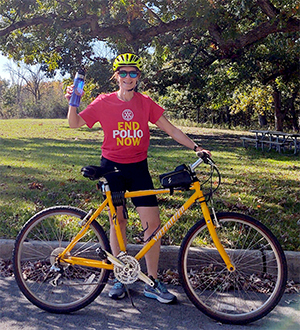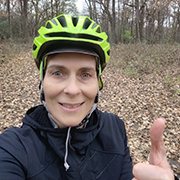Kris Tsau is an advocacy specialist at Rotary International. She is one of six Rotary staff members who will join Rotary General Secretary John Hewko in biking El Tour de Tucson in Arizona 23 November to raise money for polio eradication.

Kris Tsau, part of the Miles to End Polio team, on a training ride.
By Kris Tsau
As a PolioPlus staff member, I’ve been working toward a polio free world for over 20 years. The vast majority of that work happens at a desk behind a computer screen or on a telephone. I have often joked that I’m eradicating polio one email at a time.
Joining the Miles to End Polio Team has been a great way to get out from behind my desk to pay tribute, in a very physical way, to the dedicated men and women who work on this global effort and especially, the front-line health workers. I have had an opportunity to visit a few of the countries where we’re working to eradicate polio and see the demanding environments where vaccinators work. The conditions can be incredibly unforgiving like walking miles in scorching heat, with the strap of a vaccine carrier cutting into your shoulders. Or it could include hiking a mountain path and wading through deep snow with fingers so cold and stiff that it hurts to squeeze out those two drops of precious vaccine.
As I have trained for this race, I have spent a lot of time in the saddle – time to think about these workers. When I started training, it was August in Chicago. Chicago can be a place of extremes. There were days when it was hot and humid and I came home sweaty, exhausted, and with dust crusted into the corners of my eyes and nose.

Tsau on a recent November ride.
As the seasons have shifted, I now find myself riding in a record cold and windy November. I have thought often about these dedicated women and men who are braving the elements to ensure every child is reached.
There are other elements that make vaccine delivery challenging. The places where polio still exists are often characterized by areas of insecurity and sometimes active conflict which make it difficult and dangerous to reach children. Health workers remain committed to the job even in the face of these challenges. They do it because we have the means to safely and easily prevent this disease, and because they believe in the fundamental right of every child to be protected, including those who may live in remote areas, be on the move, or otherwise difficult to reach. I couldn’t agree more.
The dedicated work of these front-line health workers continues regardless of the natural and man-made challenges. It’s one of the truths of this global effort that is awe-inspiring. It’s a great motivation for me to keep pedaling on these cold November days in solidarity and to play my part in ensuring these health workers have the resources they need. Together, I know we can reach that last .01% and End Polio forever!
https://blog.rotary.org/2019/11/08/getting-out-from-behind-my-desk-pedaling-to-end-polio/
